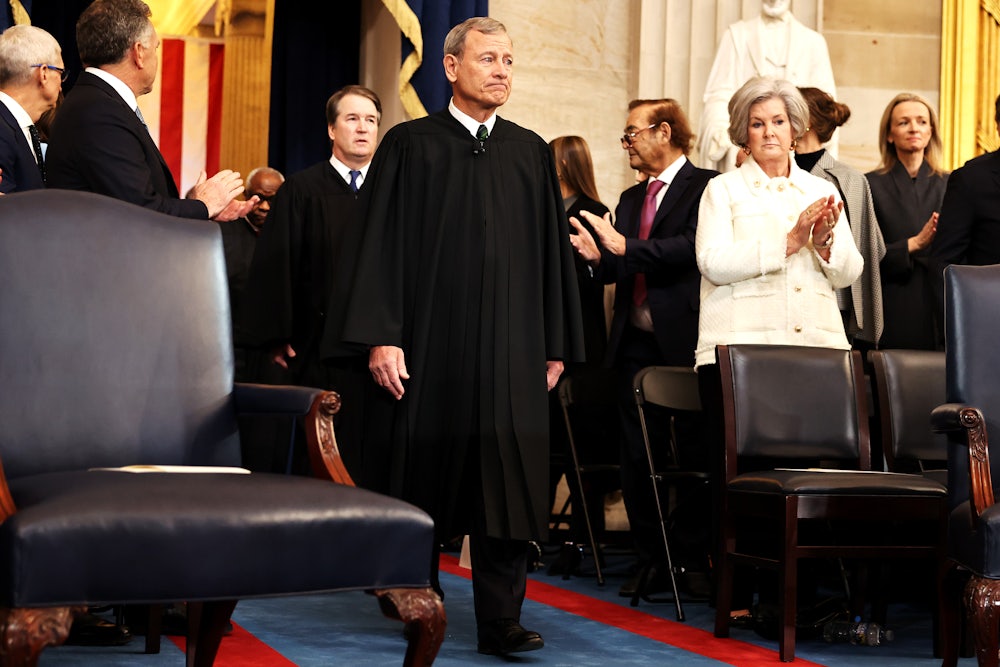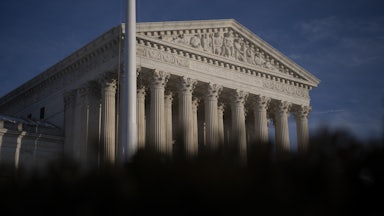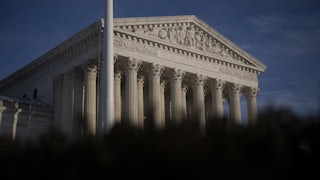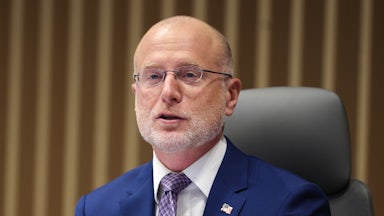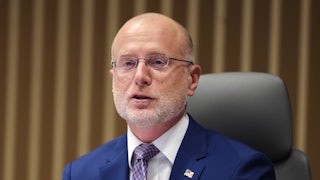Chief Justice John Roberts warned in his recent end-of-year report about multiple threats to judicial independence—and, by extension, to the American rule of law. One was the possibility that other constitutional actors would defy the orders of the federal courts.
“Two of the major pillars of our Republic—separation of powers and judicial review—create an inevitable tension between the branches of our government,” Roberts wrote. “Hamilton foresaw, and Chief Justice Marshall confirmed, the role of the judicial branch to say what the law is. But judicial independence is undermined unless the other branches are firm in their responsibility to enforce the court’s decrees.”
Roberts noted that the last time such a moment had occurred was during the civil rights era, when Southern governors resisted desegregation rulings from the federal courts. “Within the past few years, however, elected officials from across the political spectrum have raised the specter of open disregard for federal court rulings,” he wrote. “These dangerous suggestions, however sporadic, must be soundly rejected.”
Less than two months later, the crisis Roberts warned of has arrived. The Trump administration has not declared outright that it would defy the federal courts—at least, not yet. But there are signs that orders by some judges are being inconsistently followed at best. And behind the scenes, some of the administration’s leading figures are building a rhetorical groundwork to defy the courts.
Leading the charge into the breach is Elon Musk, the far-right tech oligarch who donated hundreds of millions of dollars to President Donald Trump’s reelection campaign. In return, Musk and his young cronies have spent the last three weeks trying to oust thousands of federal employees from their posts while commandeering and gutting various federal agencies. He even seized control of the Treasury’s system for processing payments in the hope of selectively cutting them off, even if the money was lawfully appropriated by Congress.
The plain text of the Constitution does not appear to be among the things Musk reveres. Last month, the White House Office of Management and Budget ordered a sweeping pause on federal grants and payments, effectively blocking trillions of dollars from flowing. (It later claimed to rescind the memo.) Recipients of those payments—states, cities, nonprofits, individuals, and so on—sued to stop the Trump administration from blocking the funds. In response, multiple federal courts across the country issued injunctions and restraining orders that require the executive branch to resume the normal flow of payments.
Judge John McConnell, a federal judge in Rhode Island, concluded in an order on Monday that the administration had continued to “improperly freeze federal funds and refused to resume disbursement of appropriated federal funds.” McConnell cited evidence submitted by the states that some pauses and freezes had continued even after his initial order. He ordered the administration to immediately unfreeze any remaining funds and to not take any further efforts to freeze funds under different orders.
In court filings, the Justice Department had claimed that the administration was trying to comply with the court orders. It also argued that any further pauses had been the result of agency discretion, not a top-down order, or that they had come from agencies not covered by the restraining orders. These arguments gave the appearance that the government was willing to comply and that any failures to do so were inadvertent.
This was hard to believe at the time. It has only since become less credible. On Monday, Musk criticized a Federal Emergency Management Agency program that reimbursed cities for housing migrants and said he would retrieve the funds. Though the $80 million in question had been appropriated by Congress for that purpose and already disbursed by the agency, the New York City comptroller alleged earlier this week that the government had clawed back the funds from a bank account.
This is but one of many examples of this impropiety. Last week, Judge Paul Engelmayer in New York ordered the Trump administration to temporarily block access to the Bureau of the Fiscal Service—the Treasury payment system that Musk seized control of—by political appointees and “special government employees,” a category into which Musk currently falls, in response to a lawsuit filed by multiple states. Musk denounced Engelmayer last Saturday by sharing a photo of him on social media with the caption “This is an activist posing as a judge.” Some MAGA-friendly lawmakers in Congress proposed impeaching Engelmayer over the order, a call that Musk echoed while calling him a “corrupt judge protecting corruption.”
Musk also lashed out at McConnell on Twitter while sharing a post that included the judge’s photograph. “What happens is that those who want the government corruption and waste to continue will shop around the country for an activist judge to do their bidding,” he wrote. “It is an undemocratic and unconstitutional power grab by a tiny group of radical leftists!” (Musk knows a lot about forum-shopping: He famously updated Twitter’s terms of service users to allow lawsuits by users to be heard by specific courts with conservative judges in Texas.)
In another post, responding to a federal judge’s order that restored the Office of Special Counsel—a federal watchdog agency unrelated to the Justice Department’s special counsels—Musk went even further in his criticism. “Democracy is being destroyed by [a] judicial coup,” he wrote. “An activist judge is not a real judge.” That language appears to be a rebuttal to allegations by Democrats that his takeover of the Treasury’s payment system and other key government functions itself amounts to a coup.
Musk’s strategy with DOGE appears to be to create enough on-the-ground damage—with dismantled agencies, fired employees, harvested data, frozen payments, and so on—that Congress, the courts, and a future Democratic administration can’t readily reverse things. A certain amount of lawlessness is baked into this approach. You can’t “move fast and break things,” as Silicon Valley’s ruling class likes to put it, if you have to comply with pesky bureaucratic and statutory requirements.
But it also seems to run deeper than that. Musk appears hostile to the idea that he can be constrained by a judge at all. He does not seem to know or care how the Constitution works. Some unfamiliarity is understandable: After all, he grew up in apartheid-era South Africa and did not receive an American civics education. His reflexive accusation that the judges are engaged in corruption merely for ruling against him and the administration is straight out of an authoritarian playbook.
In the American constitutional order, judges cannot be impeached simply for issuing rulings that politicians disagree with. This is a norm, of course, but it is an enduring one. In 1803, Democratic-Republicans in the House of Representatives impeached Justice Samuel Chase, a Federalist, for his judicial work while riding circuit. The Senate, however, declined to convict him and remove him from office. Their decision set the precedent that federal judges can only be removed from office for genuine misconduct, not for partisan or ideological reasons.
Musk’s opposition to lifetime tenure for judges only serves to illustrate the importance of preserving it. “Nothing will contribute so much as this to that independent spirit in the judges which must be essential to the faithful performance of so arduous a duty,” Alexander Hamilton wrote in Federalist 78, than the “permanent tenure of judicial office.” Lifetime tenure, he explained, was an “essential safeguard against the effects of occasional ill humors in the society,” which he described as “the arts of designing men” who would promote “dangerous innovations in the government and serious oppressions of the minor party in the community.”
If it were only Musk who criticized the courts in this fashion, that would be one thing. But these illiberal sentiments are widely shared in MAGA circles. Vice President JD Vance echoed Musk’s complaints about the courts, albeit indirectly. “If a judge tried to tell a general how to conduct a military operation, that would be illegal,” he wrote on Twitter. “If a judge tried to command the attorney general in how to use her discretion as a prosecutor, that’s also illegal. Judges aren’t allowed to control the executive’s legitimate power.”
So did Utah Senator Mike Lee, who was once on the president’s short list for the Supreme Court. He complained on Twitter earlier this month that judges were “waging an unprecedented assault on legitimate presidential authority.” In another statement, he proposed drafting a law that would prevent federal judges from issuing nationwide injunctions, such as those that have bound the Trump administration over the last few weeks.
Some have described Musk’s actions, as well as other similar ones by the Trump administration in recent weeks, as a “constitutional crisis.” That is not exactly wrong—Trump and his allies are acting in flagrant disregard for the law and the separation of powers in some of these moves—but it is not quite right, either. The full crisis is not yet upon us. So far, there are only cases that the Supreme Court has not yet heard. If the Supreme Court is ignored or defied, and the judiciary made powerless, then the crisis has arrived.
Roberts, in his most recent end-of-year remarks, correctly warned of the dangers posed by ignoring or defying judicial orders. (I critiqued other aspects of his remarks, but not those.) Despite his reference to the entire political spectrum in that warning, I suspect that he had the incoming presidential administration foremost in his mind. As he takes up these cases in the months and years to come, he should also consider how he precipitated things by allowing a constitutionally disqualified president to run for reelection and giving him sweeping immunity for most crimes that he may commit. The Supreme Court’s rulings started the last great breach in the constitutional order in 1860. They may be responsible for the next one as well.
